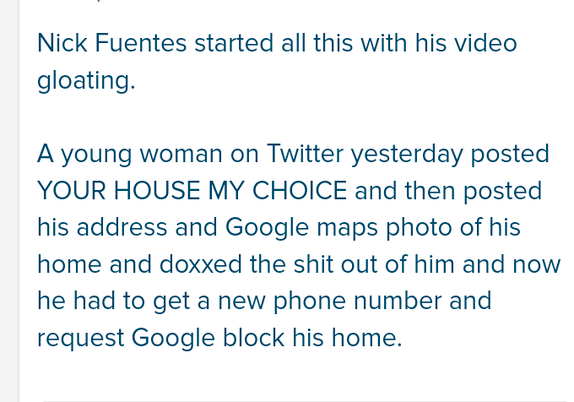This is a screenshot giving personal information about that sexist rat bastard Nicholas Fuentes. Specifically: Full name: Nicholas J Fuentes Current home address: 1826 Home Avenue Berwyn, IL 60402 Telephone number: (708) 352-7859

Report all you want. This is not getting taken down. Fuck nazis.


That’s fair for his case. But I do think that calling someone something generic like “scum” doesn’t drive home enough what they did wrong. Making fun of such people likely won’t change the person themselves, it’s more sending a message to onlookers that the behavior is undesirable and shouldn’t be emulated, so being more specific about what it is they did wrong is still important. I suppose we’ll probably just come up with new words as the need arises. I’ll have to keep up on the scene so I don’t fall behind, haha!
I think it’s great that you’re considering this, and would like to add some food for thought.
Isn’t it strange how many words in English are insults derived from medical descriptions (and sometimes medical descriptions derived from insults)? Cretin, idiot, imbecile, dumb, moron, spastic… even words we don’t consider insults which do describe disabilities are used to describe bad things. Like being “blind/deaf to <something>” or making “short-sighted” decisions. Our language is a reflection of our culture, and the English-language culture really dislikes human variation.
Finding words with the same harshness can be difficult, and it’s also great to consider what makes a word harsh. Sending a message that behavior is not ok is important too, but I think we need to consider who we include in the collateral damage. Even if we don’t intend it, many of our insults are historically created with bound associations which we perpetuate with their use. For example, moron has close ties with the American Eugenics Movement. That’s something I think anyone with a shred of empathy would want to very much not associate with.
For practical advice on what to do, I’m a fan of using absurd metaphors. The Swedish have a good one for Fuentes. “Hjulet snurrar men hamstern är död” - the wheel is spinning but the hamster is dead.
That’s a great point. The use of a more indirect shunning methodology is interesting; I feel like it’s classic - what was used before the modern point-and-laugh method, but again I worry that it doesn’t drive home the message that the behavior is undesirable. It’s more something that 2 adults would agree is a scathing commentary on the bad behavior, but a child - who is more impressionable and therefore necessary to teach what not to do - wouldn’t understand is meant to be rejection of the behavior. But maybe that’s just another facet to the issue - maybe our society has become too reliant on fast, easy-to-understand quips, when we really need to subtly guide it back to the more thoughtful, introspective lexicon of yesteryear.
That’s definitely a fair point that it’s quite indirect, which I think raises another question - why not just directly call the actions cruel / contemptuous / arrogant or belligerent / whatever else? Do we need to describe the person at all if it’s really the actions that we’re trying to discourage? Calling someone a slur, while harsh, seems to be perhaps as indirect as the dead hamster metaphor - if the goal is to condemn their choices.
I would say that’s exactly what we’re doing now, and it’s not working. It seems people can live with being called cruel, and maybe even enjoy it. But I think the feeling of being ridiculed is something more fundamentally at odds with a person’s self-image, and eats away at their confidence more than other forms of societal rejection.
Yeah, ridicule or insults are generally not very helpful at promoting positive change, unfortunately. If they were useful, we’d tell parents to insult their children as a teaching method. The fact we don’t recommend that might imply that ridicule is not great for personal growth. Insults usually only helpful as catharsis for the person using them. More reason to be considerate in choice, in my opinion.
Actual good actions are necessary to promote other good actions. I hope we both can do more good going forward.
I don’t think ridicule will change the person being ridiculed for the better - I don’t think anything really could until they make the choice to change for themselves, which people rarely have the desire to do. Ridicule is more to quiet people who are displaying bad behavior, incentivizing them to promote it a little less, and to send a message to others who idolize such people that they might want to reconsider who they look up to.
Especially given the events of the last week, that doesn’t seem to have worked either, no matter how direct. The ineffectiveness would also explain why Fuentes has now been doxxed.
I honestly haven’t seen a lot of real ridicule. Sure, there are memes and other internet things, but those are easily dismissed. I need people going up to them on the street and just laughing at them, like their entire persona is pathetic.
The internet has connected us, for sure, but it also stole the impact that real, in-person interactions can have, both positive, like having a friendly conversation with a stranger on the street, and negative, like with the shame that comes from knowing your behavior is being rejected by your peers.
I think that has to do with why doxxing is a popular way to up the ante in situations like these - things are a lot more real when they’re not behind a screen.
On further consideration, “shit-for-brains” might just be the phrase you’re looking for.
But if someone had shit for brains, that would definitely be a disability, haha! Good thing that’s not an actual condition, so it would work perfectly, thanks for the recommendation!
Is “shit for brains” as ableist as “moron” (with added vulgarity)?
(No doubt you’re the kind of person whose heart is always in the right place - love that.)
Signed,
Promise I’m not a nazi
CC: @Signtist@lemm.ee
I think the vulgarity might just be what keeps it from being ableist. I’m learning in this thread that most commonly-used words for “unintelligent” have historically been used for actual diagnoses in the medical field for people with actual disabilities, which inexorably ties the word to the concept of being unintelligent by necessity, instead of by choice. So, something vulgar that would never be used by the medical field for a real disability can, at least in theory, be used to describe someone as being willfully ignorant without the baggage of a medically-oriented usage history.
It’s not the vulgarity - the other word is historically tied to eugenics.